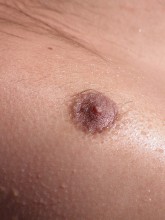Well, the first and most common reaction would be to assume that you might be pregnant. You should definitely take a pregnancy test.
However it might be a good idea to have your doctor perform the pregnancy test because if it is negative, they can perform a blood test (to double check the pregnancy and see if you have any kind of infections) AND they can also check for other issues. Indeed, there are bacterial or fungal infections that can cause nipple pain or sensitivity.
Sensitivity or pain in the nipples (and not the breast) can simply be related to hormonal changes as well. This is, of course, related to pregnancy, but it might occur around your menstrual period. If you have changed your diet or lifestyle it can affect hormones too. For example, progesterone (a hormone that is mostly present around the time of ovulation) causes water retention, and thus swelling. When water is retained in the breast tissue, it stretches and of course, begins to hurt.
Certain fabrics, fabric softeners, cleaners, and other chemicals can sometimes irritate your nipples too. For instance, if you usually wear a bra and then wore a shirt without a bra, the change in fabric might cause irritation. If you change laundry soap, bath soap, or even lotions, you might also experience similar problems.
Finally, sore nipples and/or breasts can be related to something called the climacteric syndrome. This is caused by a wild fluctuation of hormone levels and irregular ovary function. Also, sore nipples can be a sign of the onset of breast cancer, so anytime you feel anything that is noticeably irregular, you should consult a physician or OBGYN.
However it might be a good idea to have your doctor perform the pregnancy test because if it is negative, they can perform a blood test (to double check the pregnancy and see if you have any kind of infections) AND they can also check for other issues. Indeed, there are bacterial or fungal infections that can cause nipple pain or sensitivity.
Sensitivity or pain in the nipples (and not the breast) can simply be related to hormonal changes as well. This is, of course, related to pregnancy, but it might occur around your menstrual period. If you have changed your diet or lifestyle it can affect hormones too. For example, progesterone (a hormone that is mostly present around the time of ovulation) causes water retention, and thus swelling. When water is retained in the breast tissue, it stretches and of course, begins to hurt.
Certain fabrics, fabric softeners, cleaners, and other chemicals can sometimes irritate your nipples too. For instance, if you usually wear a bra and then wore a shirt without a bra, the change in fabric might cause irritation. If you change laundry soap, bath soap, or even lotions, you might also experience similar problems.
Finally, sore nipples and/or breasts can be related to something called the climacteric syndrome. This is caused by a wild fluctuation of hormone levels and irregular ovary function. Also, sore nipples can be a sign of the onset of breast cancer, so anytime you feel anything that is noticeably irregular, you should consult a physician or OBGYN.

